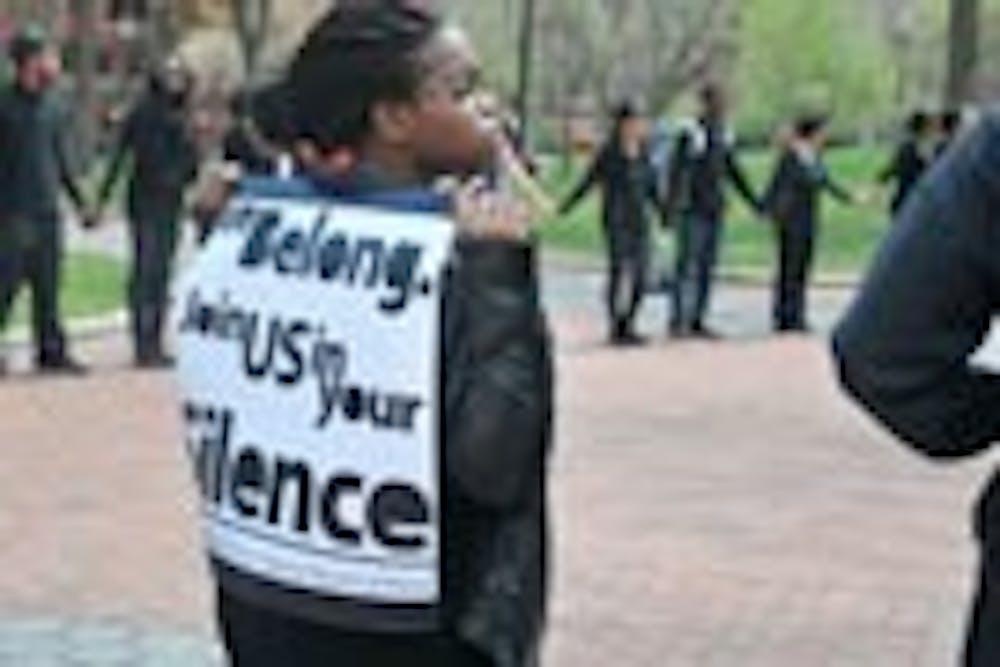
Photo slideshow of Wednesday's silent protest against racism on College Green. Related: Penn stands against racism
More than 200 students and faculty members dressed in black joined hands on College Green Wednesday in a circle — a silent protest against racism at Penn.
The protest was in response to an April 19 Daily Pennsylvanian guest column written by College of Liberal and Professional Studies student Christopher Abreu in which he described his run-in with racism on campus. Abreu questioned whether he belonged at the University and warned minority prospective students not to attend Penn.
On the night of April 10, Abreu was confronted by four students who made racist comments, including harmful racial slurs.
Though Abreu had experienced prior racist encounters during his three years at Penn, he cited this incident as “the straw that broke the camel’s back.”
During the protest, students remained silent to represent the silence caused by racist speech and aggressions. The protest — organized overnight through Facebook, emails and word of mouth — is part of a movement inspired by Abreu’s story and other racist encounters on campus.
Many students chose to remain mute throughout the day, a form of non-violent protest inspired by the Day of Silence of the lesbian, gay, bisexual and transgender community.
The protest began at noon when a small group of students gathered by the Benjamin Franklin statue in front of College Hall. Over the course of two hours, students, passersby and community members — including Penn President Amy Gutmann — joined hands and expanded the circle.
A group of students, including many minority student leaders, planned the event on Tuesday night, College senior Justin Ching said.
“Its inception was organic. This group of people who have worked together in the past, converged once again to discuss our initiatives,” he added.
“There was very little marketing, but we were still able to draw many people,” Ching said. “This speaks to the fact that this is an important issue that people feel strongly about.”
“This was the most amazing event I’ve ever taken part of at Penn,” College junior Becca Elman said.
Since his column was published, Abreu has received countless emails from students and faculty members sharing similar sentiments that they do not belong at Penn.
While the responses are overwhelming, Abreu said he has been motivated to start a nonprofit movement — called “We Belong!” — to make sure all students have a voice and find a sense of belonging in their communities.
Dialogue about race should not be limited to “just black and white,” but be “inclusive for everyone,” he said.
“The buzz generated by this article is necessary,” College sophomore Sam Burwell said, adding that both current and prospective Penn students to be aware of the issues related to racism on campus.
Wednesday night, the United Minorities Council facilitated an open forum for students to discuss their responses to Abreu, as well as their personal stories surrounding racism, social groups and belonging at Penn. Students also discussed how to increase the profile of resources for minorities on campus, such as the UMC.
Nursing sophomore and UMC Political Chairwoman Elizabeth Park said she was happy to see many new faces at the meeting.
The protesters also started a blog titled “We Belong at Penn” as an open forum for people to share their encounters with racial microaggressions.
Abreu, who was moved by the protest and ensuing discussions, said it “makes me and others feel like we are not alone.”
As for his advice that prospective minority students avoid Penn — Abreu is thinking twice. “I did feel like I belonged today,” he said.
Karlene Burrell-McRae, who is the director of Makuu — Penn’s black cultural center — and has been at Penn for more than 15 years, said while she has seen similar incidents and protests, this is the first time the issue of belonging has been addressed directly.
“The concept of belonging had been under the surface before, but this was the first time that someone has publicly named it,” she said. “This is more of a big deal because it’s a problem that is harder to fix. How do we make people feel like they belong? The answer is very complicated."
Burrell-McRae stressed that Makuu, which recently celebrated its 10-year anniversary, continues to be a support system for black students and a “home away from home.”
Contributing writer Bridget McGeehan contributed reporting to this article.
The Daily Pennsylvanian is an independent, student-run newspaper. Please consider making a donation to support the coverage that shapes the University. Your generosity ensures a future of strong journalism at Penn.
DonatePlease note All comments are eligible for publication in The Daily Pennsylvanian.





